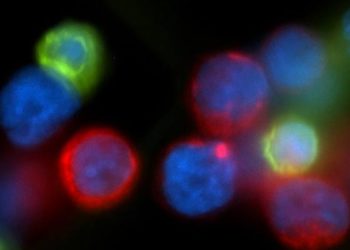Assisted conception not associated with increased pediatric cancer risk
Image: PD
1. Overall, children born after in vitro fertilization (IVF) did not have increased risk of developing cancer before age 15.
2. There was a small increase in absolute risk of rhabdomyosarcoma and hepatoblastoma among children conceived via IVF.
Evidence Rating Level: 2 (Good)
Study Rundown: As in vitro fertilization (IVF) becomes more common, it is important to understand what, if any, health risks exist for children conceived via IVF. Previous studies have shown or suggested small increases in overall cancer risk for children conceived via IVF.
By carefully matching records from two large national databases, one of IVF pregnancies and another of childhood cancers, the authors were able to determine the number of cancers that occurred among their cohort of 106,013 children born after assisted conception. They then compared this to the number of cancers that would be expected in the cohort if they were the same as the general population. The expected number of cancers was 109.7 and the actual number was 108, suggesting that IVF does not increase overall cancer risk (P=0.87).
Two types of cancer had a higher incidence than expected in the IVF cohort: hepatoblastoma and rhabdomyosarcoma. However, the absolute increases in risk for these cancers were small: 6.21 cases per 1 million person-years for hepatoblastoma and 8.82 cases per 1 million person-years for rhabdomyosarcoma.
This is one of the largest and most thorough studies to address the question of cancer risk after IVF and the finding that overall cancer risk was not increased should be reassuring to physicians and families of children conceived via IVF.
Click to read the study, published today in NEJM
Relevant Reading: Systematic review and meta-analysis of cancer risk in children born after assisted reproduction
In-Depth [retrospective cohort study]: This study involved 106,013 children conceived by IVF and born in Britain between 1992 and 2008. The study benefits from the completeness of the two national databases used, the HFEA (Human Fertilisation and Embryology Authority) and NRCT (National Registry of Childhood Tumours). It should be noted that the NRCT only collects data on cancer diagnoses before the age of 15 years, so this study may not detect associations between IVF and cancers that tend to present in later adolescence.
The study found increases in the risk of hepatoblastoma and rhabdomyosarcoma that were statisfically significant, but small in absolute terms. There were 6 hepatoblastomas compared to 1.8 expected (standardized incidence ratio 3.64; 95% CI, 1.34 to 7.93; P=0.02) and 10 rhabdomyosarcomas compared to 3.8 expected (standardized incidence ratio 2.62; 95% CI, 1.26 to 4.82; P=0.02).
Hepatoblastoma risk was associated with lower birth weight in the study, an association that has also been noted in other studies. The excess hepatoblastomas could therefore be related to the known association between IVF and low birth weight.
By Tomi Jun and Adrienne Cheung
More from this author: Early risk factor for progression of cystic fibrosis identified, Gut microbes implicated in stroke and heart attacks: new dietary link, New leukemia mutation offers therapeutic targets, Childhood ADHD associated with increased risk of suicide, A marker of aggressive liver cancer and potential therapeutic target identified
©2012-2013 2minutemedicine.com. All rights reserved. No works may be reproduced without expressed written consent from 2minutemedicine.com. Disclaimer: We present factual information directly from peer reviewed medical journals. No post should be construed as medical advice and is not intended as such by the authors, editors, staff or by 2minutemedicine.com. PLEASE SEE A HEALTHCARE PROVIDER IN YOUR AREA IF YOU SEEK MEDICAL ADVICE OF ANY SORT.







